
Software and Systems Modeling
Scope & Guideline
Advancing the Art of Software Engineering
Introduction
Aims and Scopes
- Modeling Methodologies:
The journal encompasses a wide range of methodologies for software and systems modeling, including model-driven engineering, domain-specific modeling languages, and formal methods. It aims to propose and refine techniques that enhance the rigor and applicability of modeling practices. - Interdisciplinary Approaches:
Research published in the journal often intersects with disciplines such as artificial intelligence, data science, and systems engineering. This interdisciplinary focus fosters innovative solutions to complex modeling challenges. - Practical Applications:
The journal highlights the application of modeling techniques in real-world scenarios, including industry-specific applications in areas like IoT, software engineering, and business process management. This emphasis on practical relevance supports the journal's goal of bridging theory and practice. - Evaluation and Verification:
A significant aspect of the journal's scope includes the evaluation and verification of modeling tools and methodologies. This encompasses empirical studies, case studies, and systematic reviews that assess the effectiveness of different modeling approaches. - Emerging Technologies:
The journal is committed to exploring modeling in the context of emerging technologies such as cloud computing, blockchain, and AI. This focus ensures that the research remains relevant in the rapidly evolving technological landscape.
Trending and Emerging
- AI and Machine Learning in Modeling:
Recent publications highlight the integration of AI and machine learning techniques into modeling practices, particularly in automating model generation and enhancing model verification processes. This trend signifies a move towards more intelligent and adaptive modeling frameworks. - Low-Code and No-Code Development:
There is a growing emphasis on low-code and no-code platforms within the modeling community. Research focusing on these approaches aims to democratize software development and enable non-technical users to engage in modeling activities. - Sustainability and Ethical Modeling:
Emerging themes include modeling for sustainability and addressing ethical considerations in software design. This reflects a broader societal shift towards responsible technology development and the need for models that account for social and environmental impacts. - Digital Twins and Cyber-Physical Systems:
The concept of digital twins and their application in modeling cyber-physical systems is gaining traction. This trend showcases the need for real-time, data-driven models that can represent complex interactions in physical and digital environments. - Interoperability and Standardization:
Research focusing on interoperability among different modeling languages and tools is on the rise. This trend highlights the importance of creating standardized approaches to enhance collaboration and integration across diverse modeling environments.
Declining or Waning
- Traditional Software Development Models:
There has been a noticeable decline in publications focused on traditional software development models, such as Waterfall or V-Model approaches. This shift reflects a growing industry preference for agile and iterative methodologies. - Basic Model Transformation Techniques:
Research centered on fundamental model transformation techniques appears to be waning, possibly due to the emergence of more sophisticated and automated approaches that leverage AI and machine learning. - Static Analysis Techniques:
The prevalence of papers focusing solely on static analysis of models has decreased, as researchers are increasingly integrating dynamic analysis and real-time validation methods to address modern software challenges. - Single-Domain Focused Studies:
There is a trend away from studies that focus exclusively on a single domain of modeling. Instead, interdisciplinary and multi-domain studies are becoming more prevalent, reflecting a broader understanding of the interconnected nature of modeling in various contexts.
Similar Journals
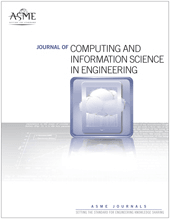
JOURNAL OF COMPUTING AND INFORMATION SCIENCE IN ENGINEERING
Pioneering Research in Computing and Engineering DisciplinesWelcome to the JOURNAL OF COMPUTING AND INFORMATION SCIENCE IN ENGINEERING, a premier publication from ASME that focuses on the dynamic intersection of computing and engineering disciplines. With an ISSN of 1530-9827 and E-ISSN 1944-7078, this journal serves as a critical platform for disseminating innovative research and advancements in areas such as Computer Graphics, Computer-Aided Design, Software Engineering, and Industrial Manufacturing. The journal spans from 2001 to 2024 and has been recognized for its excellence, boasting impressive Scopus rankings including Q1 in Industrial and Manufacturing Engineering and Q2 in both Computer Graphics and Computer Science Applications. It offers a unique opportunity for researchers, professionals, and students to engage with high-impact studies and present their contributions to a diverse audience. As a member of the esteemed ASME family, this journal promotes open dialogue and fosters the growth of knowledge in technical fields, while emphasizing practical applications and interdisciplinary collaboration. Join us in exploring the forefront of computing and engineering through rigorous research and insightful articles that drive innovation and progress.
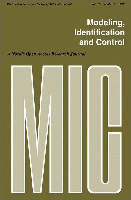
MODELING IDENTIFICATION AND CONTROL
Fostering Collaboration Across Engineering DisciplinesMODELING IDENTIFICATION AND CONTROL is a prominent academic journal dedicated to the fields of Computer Science Applications, Control and Systems Engineering, Modeling and Simulation, and Software. Published by MIC in Norway, this open access journal has been providing valuable insights and innovative research since 1980, promoting the free dissemination of knowledge. With a reputation reflected in its 2023 quartile rankings—Q3 in Computer Science Applications, Q2 in Control and Systems Engineering, and Modeling and Simulation, as well as Q3 in Software—this journal plays a vital role in advancing theoretical and practical solutions within its disciplines. Researchers and professionals benefit from its rigorous peer-review process and impactful publications, fostering collaboration and the exploration of emerging technologies across various applications. The journal's continual commitment to excellence is exemplified by its active presence in Scopus, where it maintains respectable rankings in relevant engineering and computer science subcategories, supporting its goal to be a pivotal resource for scholarly communication and practical advancements.
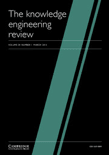
KNOWLEDGE ENGINEERING REVIEW
Exploring Innovations in AI and Software EngineeringKNOWLEDGE ENGINEERING REVIEW, published by Cambridge University Press, is a prestigious academic journal dedicated to the dynamic fields of Artificial Intelligence and Software Engineering. With an ISSN of 0269-8889 and an E-ISSN of 1469-8005, this journal has been a pivotal platform for scholarly communication since its inception in 1984, with its impact continuously recognized through its Q2 category ranking in both fields as of 2023. Operating from its headquarters in the United Kingdom, it boasts a robust Scopus ranking, placing it in the 73rd percentile for Software and the 69th percentile for Artificial Intelligence, a testament to its influence and relevance. Though it does not offer open access, the journal remains dedicated to advancing knowledge engineering by publishing high-quality research articles, insightful reviews, and innovative methodologies that address both theoretical and practical challenges. Researchers, professionals, and students find this journal an invaluable resource for cutting-edge developments in the realm of knowledge engineering.
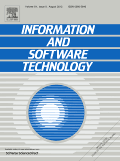
INFORMATION AND SOFTWARE TECHNOLOGY
Exploring the Intersection of Technology and Research ExcellenceINFORMATION AND SOFTWARE TECHNOLOGY, published by Elsevier, is a leading journal that stands at the forefront of the fields of software engineering, information systems, and computer science applications. Since its inception in 1970 and with a focus extending to 2025, this esteemed publication has made significant contributions to the discourse on technological advancements and innovations. In 2023, it has achieved a remarkable Q1 categorization across multiple domains, including Computer Science Applications, Information Systems, and Software, reflecting its excellence and relevance in the academic community. With Scopus rankings that place it in the top percentiles in its categories (85th, 83rd, and 83rd respectively), the journal serves as an essential platform for researchers, professionals, and students eager to disseminate and engage with cutting-edge research and developments. While it does not currently offer Open Access options, the knowledge curated within its pages remains invaluable for advancing the fields of information technology and software development.

FORMAL ASPECTS OF COMPUTING
Shaping the Future of Software Engineering through Rigorous ResearchFORMAL ASPECTS OF COMPUTING is a distinguished journal published by the ASSOCIATION FOR COMPUTING MACHINERY, dedicated to the fields of Software Engineering and Theoretical Computer Science. With the ISSN 0934-5043 and E-ISSN 1433-299X, this journal has made a significant impact in its categories, achieving a Q3 ranking in both Software and Theoretical Computer Science as of 2023. The journal spans over three decades since its inception in 1989, providing a platform for high-quality research that addresses critical formal methods and their applications in computing. While it currently does not offer open access, it remains an essential resource for researchers and practitioners in the field. The journal's credibility is bolstered by its Scopus rankings, placing it in the top half of both theoretical and software-related fields. By engaging with current trends and fostering innovative approaches, FORMAL ASPECTS OF COMPUTING stands as a vital repository of knowledge and a catalyst for future advancements in the discipline.
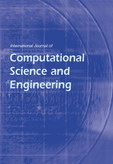
International Journal of Computational Science and Engineering
Fostering Interdisciplinary Insights in Engineering and ScienceThe International Journal of Computational Science and Engineering, published by InderScience Enterprises Ltd, is a premier platform dedicated to the interdisciplinary field of computational science and engineering. With an ISSN of 1742-7185 and an E-ISSN of 1742-7193, the journal has been serving the academic community since its establishment in 2005 and will continue to do so until 2024. Notably categorized in the Q3 quartile for various domains, including Computational Mathematics, Software, and Hardware and Architecture, it holds respectable rankings in Scopus, evidencing its importance in advancing research and practice. While the journal is not open-access, it offers subscription options that ensure wide dissemination among researchers, professionals, and students. The journal aims to publish high-quality original research articles, survey papers, and case studies that contribute to the theoretical and practical aspects of computational techniques and methodologies. In a rapidly evolving digital landscape, this journal is a valuable resource for those seeking to push the boundaries of knowledge in computational science.

Software Impacts
Exploring Innovations that Shape Software DevelopmentSoftware Impacts is an esteemed academic journal published by ELSEVIER, dedicated to advancing the field of software science and informing best practices in development and application. With an ISSN of 2665-9638, this journal facilitates the dissemination of impactful research from 2019 to 2024, making it a valuable resource for both established researchers and promising students alike. Although it currently holds a Q3 ranking in the category of Software and ranks at #270/407 in Scopus, it continues to contribute significantly to the discourse surrounding software-related innovations and methodologies. The journal’s open access policy enhances accessibility and encourages a broader readership, fostering an environment where critical discussions flourish. By addressing the ongoing challenges and advancements in software technology, Software Impacts plays a crucial role in shaping the future of software development and its applications globally.

INTEGRATED COMPUTER-AIDED ENGINEERING
Exploring Innovative Solutions Through Interdisciplinary ResearchINTEGRATED COMPUTER-AIDED ENGINEERING (ISSN: 1069-2509, E-ISSN: 1875-8835) is a prominent journal published by IOS PRESS in the Netherlands, renowned for its rigorous coverage of the interdisciplinary fields of artificial intelligence, computational theory, and software applications. Since its inception in 1993, this journal has consistently contributed to the academic discourse, standing out in the Q1 and Q2 quartiles across various categories as of 2023. With Scopus rankings placing it in the93rd percentile for computational theory and mathematics and 91st for theoretical computer science, it is a vital resource for researchers and professionals seeking to explore innovative methodologies and advanced engineering solutions. While not an open-access journal, INTEGRATED COMPUTER-AIDED ENGINEERING provides comprehensive access options for institutional subscribers, ensuring the dissemination of vital research findings to a global audience. This journal aims to facilitate the exchange of knowledge, inspire future studies, and foster technological advancements in computer-aided engineering.
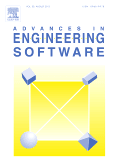
ADVANCES IN ENGINEERING SOFTWARE
Exploring Interdisciplinary Frontiers in Software Development.ADVANCES IN ENGINEERING SOFTWARE, published by Elsevier Science Ltd, stands at the forefront of interdisciplinary research in the realms of engineering and software development. With an impressive impact factor reflected in its Q1 and Q2 rankings in the Engineering (Miscellaneous) and Software categories, respectively, this journal serves as an essential platform for researchers and practitioners alike to disseminate innovative findings and methodologies from 1982 to the present. Strategically positioned within the United Kingdom, it engages scholars, professionals, and students by publishing high-quality articles that emphasize advancements in software applications related to engineering challenges. Although it does not currently offer open access, the journal remains highly regarded within the academic community, consistently attracting impactful research and maintaining a commendable Scopus ranking within the top tiers of both general engineering and software disciplines. Explore the latest contributions to enhance your knowledge and stay updated on trailblazing developments in engineering software.
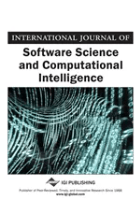
International Journal of Software Science and Computational Intelligence-IJSSCI
Empowering Researchers in the Realm of Software ScienceInternational Journal of Software Science and Computational Intelligence (IJSSCI) is a prominent academic journal published by IGI Global, dedicated to advancing the fields of software science and computational intelligence. With its ISSN 1942-9045 and E-ISSN 1942-9037, IJSSCI offers a platform for researchers, practitioners, and students to disseminate innovative research findings, theoretical advancements, and practical applications in areas such as algorithm development, machine learning, and software engineering. Although the journal currently does not operate under an open access model, its rigorous peer-review process ensures high-quality publications that contribute significantly to the academic discourse. Based in Hershey, PA, IJSSCI is recognized for its commitment to fostering collaboration among professionals in the technology and computer science fields, making it an essential resource for those looking to stay at the forefront of software science advancements.